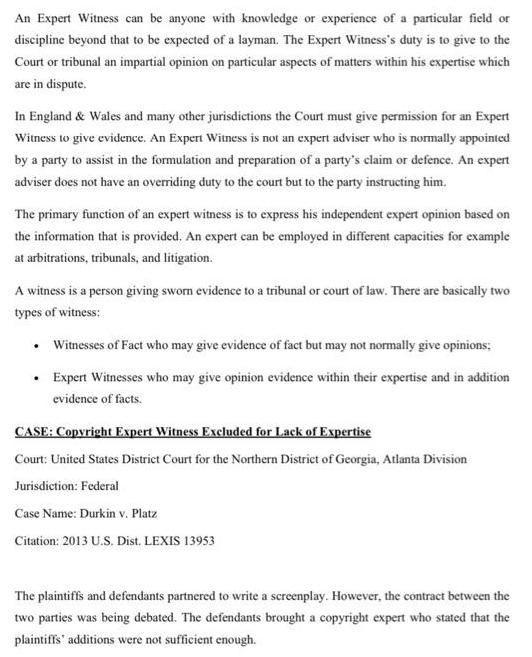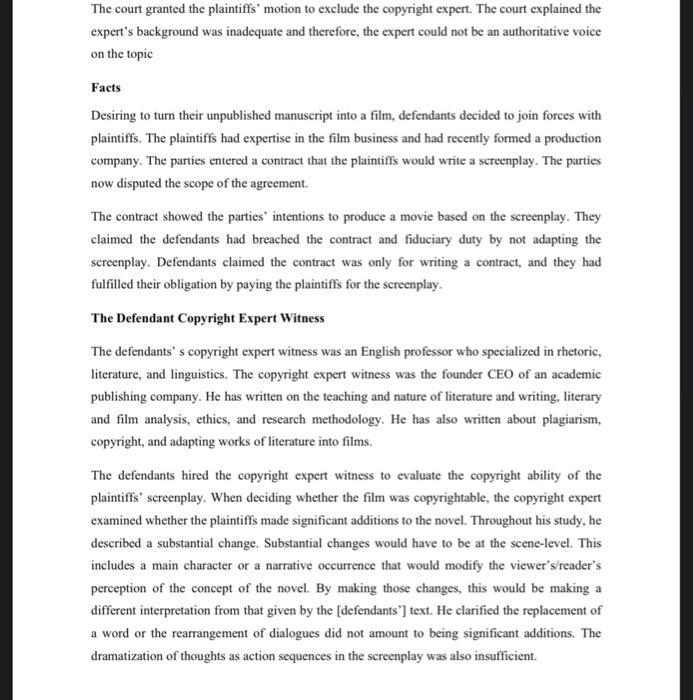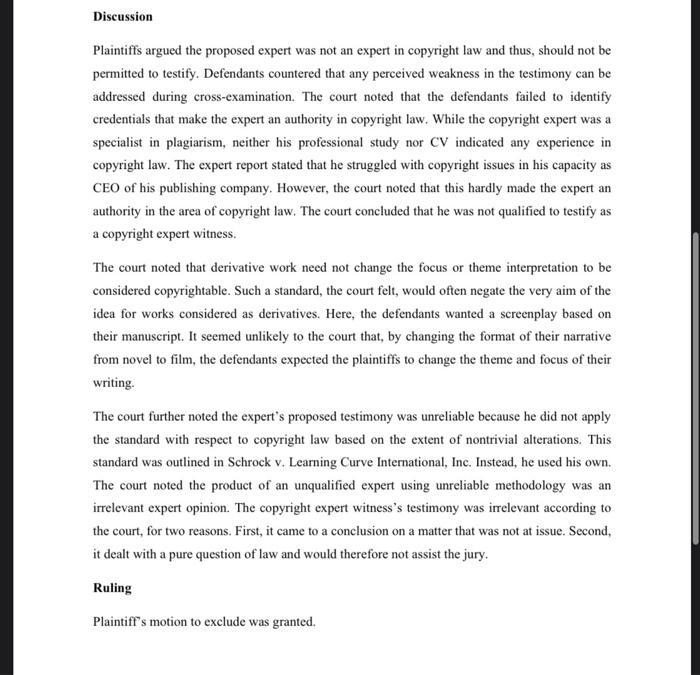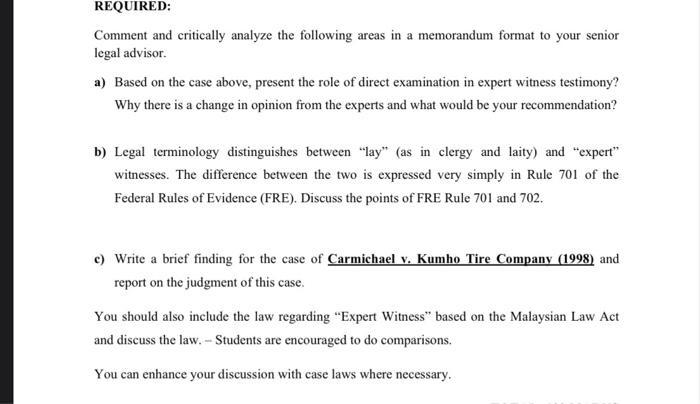An Expert Witness can be anyone with knowledge or experience of a particular field or discipline beyond that to be expected of a layman.




An Expert Witness can be anyone with knowledge or experience of a particular field or discipline beyond that to be expected of a layman. The Expert Witness's duty is to give to the Court or tribunal an impartial opinion on particular aspects of matters within his expertise which are in dispute. In England & Wales and many other jurisdictions the Court must give permission for an Expert Witness to give evidence. An Expert Witness is not an expert adviser who is normally appointed by a party to assist in the formulation and preparation of a party's claim or defence. An expert adviser does not have an overriding duty to the court but to the party instructing him. The primary function of an expert witness is to express his independent expert opinion based on the information that is provided. An expert can be employed in different capacities for example at arbitrations, tribunals, and litigation. A witness is a person giving sworn evidence to a tribunal or court of law. There are basically two types of witness: Witnesses of Fact who may give evidence of fact but may not normally give opinions: Expert Witnesses who may give opinion evidence within their expertise and in addition evidence of facts. CASE: Copyright Expert Witness Excluded for Lack of Expertise Court: United States District Court for the Northern District of Georgia, Atlanta Division Jurisdiction: Federal Case Name: Durkin v. Platz Citation: 2013 U.S. Dist. LEXIS 13953 The plaintiffs and defendants partnered to write a screenplay. However, the contract between the two parties was being debated. The defendants brought a copyright expert who stated that the plaintiffs' additions were not sufficient enough. The court granted the plaintiffs' motion to exclude the copyright expert. The court explained the expert's background was inadequate and therefore, the expert could not be an authoritative voice on the topic Facts Desiring to turn their unpublished manuscript into a film, defendants decided to join forces with plaintiffs. The plaintiffs had expertise in the film business and had recently formed a production company. The parties entered a contract that the plaintiffs would write a screenplay. The parties now disputed the scope of the agreement. The contract showed the parties intentions to produce a movie based on the screenplay. They claimed the defendants had breached the contract and fiduciary duty by not adapting the screenplay. Defendants claimed the contract was only for writing a contract, and they had fulfilled their obligation by paying the plaintiffs for the screenplay. The Defendant Copyright Expert Witness The defendants's copyright expert witness was an English professor who specialized in rhetoric, literature, and linguistics. The copyright expert witness was the founder CEO of an academic publishing company. He has written on the teaching and nature of literature and writing, literary and film analysis, ethics, and research methodology. He has also written about plagiarism, copyright, and adapting works of literature into films. The defendants hired the copyright expert witness to evaluate the copyright ability of the plaintiffs' screenplay. When deciding whether the film was copyrightable, the copyright expert examined whether the plaintiffs made significant additions to the novel. Throughout his study, he described a substantial change. Substantial changes would have to be at the scene-level. This includes a main character or a narrative occurrence that would modify the viewer's/reader's perception of the concept of the novel. By making those changes, this would be making a different interpretation from that given by the [defendants'] text. He clarified the replacement of a word or the rearrangement of dialogues did not amount to being significant additions. The dramatization of thoughts as action sequences in the screenplay was also insufficient. Discussion Plaintiffs argued the proposed expert was not an expert in copyright law and thus, should not be permitted to testify. Defendants countered that any perceived weakness in the testimony can be addressed during cross-examination. The court noted that the defendants failed to identify credentials that make the expert an authority in copyright law. While the copyright expert was a specialist in plagiarism, neither his professional study nor CV indicated any experience in copyright law. The expert report stated that he struggled with copyright issues in his capacity as CEO of his publishing company. However, the court noted that this hardly made the expert an authority in the area of copyright law. The court concluded that he was not qualified to testify as a copyright expert witness. The court noted that derivative work need not change the focus or theme interpretation to be considered copyrightable. Such a standard, the court felt, would often negate the very aim of the idea for works considered as derivatives. Here, the defendants wanted a screenplay based on their manuscript. It seemed unlikely to the court that, by changing the format of their narrative from novel to film, the defendants expected the plaintiffs to change the theme and focus of their writing. The court further noted the expert's proposed testimony was unreliable because he did not apply the standard with respect to copyright law based on the extent of nontrivial alterations. This standard was outlined in Schrock v. Learning Curve International, Inc. Instead, he used his own. The court noted the product of an unqualified expert using unreliable methodology was an irrelevant expert opinion. The copyright expert witness's testimony was irrelevant according to the court, for two reasons. First, it came to a conclusion on a matter that was not at issue. Second, it dealt with a pure question of law and would therefore not assist the jury. Ruling Plaintiff's motion to exclude was granted. REQUIRED: Comment and critically analyze the following areas in a memorandum format to your senior legal advisor. a) Based on the case above, present the role of direct examination in expert witness testimony? Why there is a change in opinion from the experts and what would be your recommendation? b) Legal terminology distinguishes between "lay" (as in clergy and laity) and "expert" witnesses. The difference between the two is expressed very simply in Rule 701 of the Federal Rules of Evidence (FRE). Discuss the points of FRE Rule 701 and 702. c) Write a brief finding for the case of Carmichael v. Kumho Tire Company (1998) and report on the judgment of this case. You should also include the law regarding "Expert Witness" based on the Malaysian Law Act and discuss the law. - Students are encouraged to do comparisons. You can enhance your discussion with case laws where necessary.
Step by Step Solution
3.52 Rating (165 Votes )
There are 3 Steps involved in it
Step: 1
a The role of direct examination in expert witness testimony is to elicit information from the witness that is relevant to the case Direct examination is used to present the experts qualifications and ...
See step-by-step solutions with expert insights and AI powered tools for academic success
Step: 2

Step: 3

Ace Your Homework with AI
Get the answers you need in no time with our AI-driven, step-by-step assistance
Get Started


